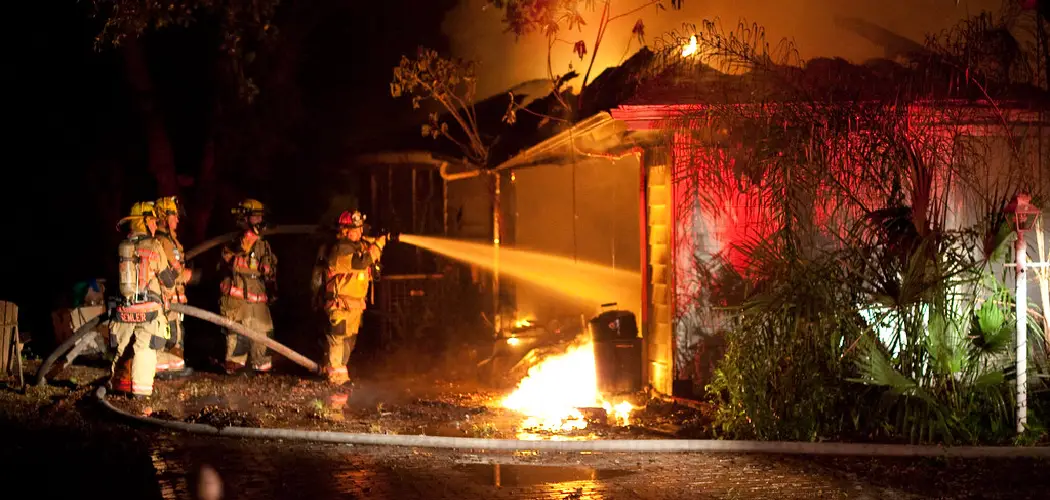A garage fire is a serious safety hazard that can easily destroy your home and everything in it. Fortunately, you can take some simple steps to prevent a garage fire from happening in the first place.
First, make sure to keep flammable materials like gasoline and chemicals stored in safe, approved containers. Second, keep your garage well-ventilated to prevent buildups of fumes that could ignite.
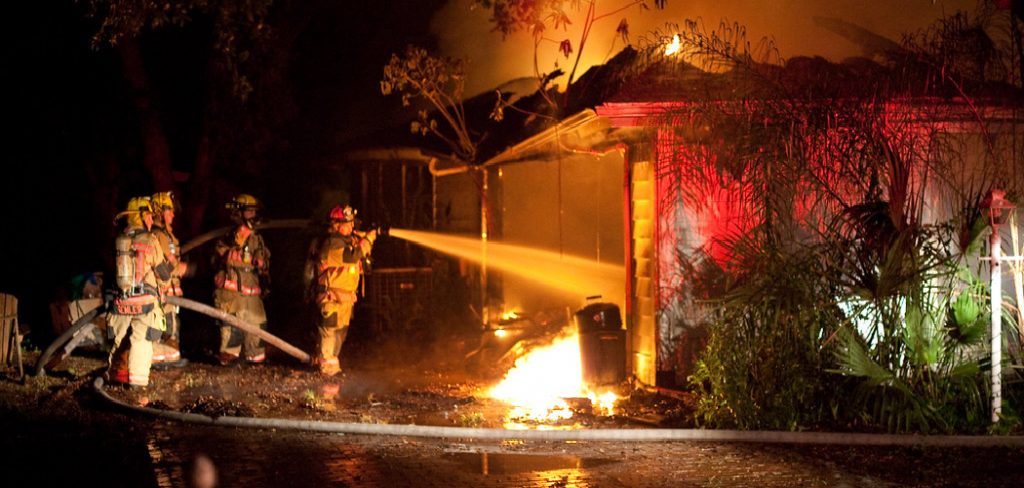
Finally, regularly inspect electrical wiring and appliances to ensure they are in good working order and do not pose a fire hazard. By taking these proactive steps, you can help prevent a devastating garage fire from occurring. In this blog post, you will learn in detail how to prevent a garage fire.
Summary: Garage fires can start quickly and spread rapidly. Thus, it is crucial to take proactive measures to prevent them. First, clear any clutter, flammable chemicals or materials, and propane tanks from the garage. Next, avoid overloading electrical outlets and ensure all wiring is in good condition. Maintaining appliances such as dryers, freezers, and space heaters is also essential.
Step by Step Processes for How to Prevent a Garage Fire
1.Keep Your Garage Clean and Organized:
A cluttered garage is a significant fire hazard. Keep your garage clean and organized by regularly disposing of trash, debris, and other combustible materials. Store items on shelves or in cabinets, and avoid stacking things too close to the ceiling or walls, which can help slow the spread of fire if one occurs.
2.Maintain Electrical Systems:
Faulty wiring and overloaded circuits are common causes of garage fires. Inspect the wiring in your garage regularly, looking for signs of wear, fraying, or exposed wires. If you find any issues, hire a licensed electrician to address them. Additionally, avoid overloading outlets and circuits by using power strips with built-in circuit breakers.
3. Store Flammable Materials Properly:
Store flammable liquids such as gasoline, paint thinner, and propane in approved, clearly labeled containers with tight-fitting lids. Keep these containers away from heat sources, such as space heaters, and store them in a well-ventilated area, preferably outside the garage or in a separate shed.
4.Use Appliances and Tools With Caution:
When using appliances or tools in your garage, always follow the manufacturer’s safety guidelines. Unplug tools when not in use, and avoid using them near flammable materials. Never leave heat-producing appliances, like space heaters or soldering irons, unattended.
5.Install Smoke Detectors and Fire Extinguishers:
Install smoke detectors in your garage and test them monthly to ensure they are working properly. Additionally, keep a fire extinguisher in your garage and familiarize yourself with how to use it. Remember to have your fire extinguisher inspected annually to ensure it’s in good working order.
6.Avoid Using Extension Cords:
Extension cords are a common cause of garage fires due to overheating or short-circuiting. Whenever possible, plug appliances and tools directly into a wall outlet rather than using an extension cord. If you must use an extension cord, choose one with a sufficient amperage rating for the device you’re powering and avoid running it under rugs or through doorways.
7.Properly Maintain and Store Vehicles:
Perform regular maintenance on your vehicles, including checking for fuel or oil leaks. If you notice any issues, address them promptly. When storing a vehicle in your garage, avoid leaving it running, as the exhaust can cause a buildup of carbon monoxide and create a fire hazard.
8.Install a Carbon Monoxide Detector:
Carbon monoxide is a colorless, odorless gas that can be produced by running vehicles or fuel-burning appliances. Install a carbon monoxide detector in your garage to alert you to dangerous levels of this deadly gas.
9.Keep Garage Doors and Windows Closed When Not in Use:
Open garage doors and windows can allow embers from a nearby fire to enter your garage and ignite flammable materials. Keep your garage doors and windows closed when not in use to reduce this risk.
10. Practice Safe Grilling and Smoking Habits:
If you use a grill or smoker in or near your garage, follow safe practices to prevent a fire. Keep grills and smokers a safe distance from your garage, and never leave them unattended while in use. Clean them regularly to prevent the buildup of grease and debris, which can catch fire.
11.Inspect and Maintain Garage Door Openers:
Malfunctioning garage door openers can be a fire hazard if they cause the door to close on flammable materials or overheat due to mechanical issues. Inspect your garage door opener regularly for signs of wear and tear, and have any issues addressed by a professional.
12.Create a Fire-resistant Barrier:
Consider installing fire-resistant drywall or other materials on the walls and ceiling of your garage to help contain a fire if one occurs. This can slow the spread of flames, giving you more time to escape and allowing firefighters to extinguish the blaze before it causes extensive damage.
13.Install a Fire-rated Garage Door:
A fire-rated garage door is designed to withstand high temperatures and slow the spread of fire. Installing a fire-rated door can help protect your home and its contents in the event of a garage fire.
14.Keep Combustible Materials Away From Ignition Sources:
Never store combustible materials, such as paper, cardboard, or rags, near ignition sources like water heaters, furnaces, or electrical panels. Maintain a clear space of at least three feet around these appliances to reduce the risk of a fire starting.
15.Regularly Inspect and Maintain Heating Systems:
If your garage is heated, ensure the heating system is inspected and maintained regularly by a professional. This includes checking for signs of wear, leaks, and other issues that could cause a fire.
16.Use Caution With Propane Tanks:
If you store propane tanks in your garage, ensure they are upright and secure to prevent leaks. Check for signs of corrosion or damage, and never store propane tanks near heat sources or flame-producing appliances.
17.Inspect and Maintain Lawn Equipment:
Regularly inspect and maintain your lawn equipment, such as lawnmowers and trimmers, to prevent fuel leaks and other issues that could lead to a fire. Keep these items clean and free of debris, and store them away from flammable materials.
18.Develop and Practice an Emergency Escape Plan:
In the event of a garage fire, having an emergency escape plan can save lives. Develop a plan that includes two ways to exit your garage, and practice it with your family regularly. Ensure everyone knows how to call 911 and where to meet outside in case of a fire.
19.Communicate Fire Safety With Your Family:
Discuss fire safety with your family and make sure everyone understands the importance of preventing garage fires. Teach children about the dangers of playing with matches, lighters, and flammable liquids, and stress the importance of keeping the garage clean and organized.
20.Consider Installing a Residential Sprinkler System:
A residential sprinkler system can help control a fire in its early stages, preventing it from spreading and causing extensive damage. If you have a sprinkler system installed in your home, consider extending it to cover your garage as well.
By following these steps, you can significantly reduce the risk of a garage fire and protect your home, belongings, and family from this dangerous and potentially devastating event. Remember, prevention is key when it comes to fire safety, and a little effort now can go a long way in keeping your garage and home safe from fires.
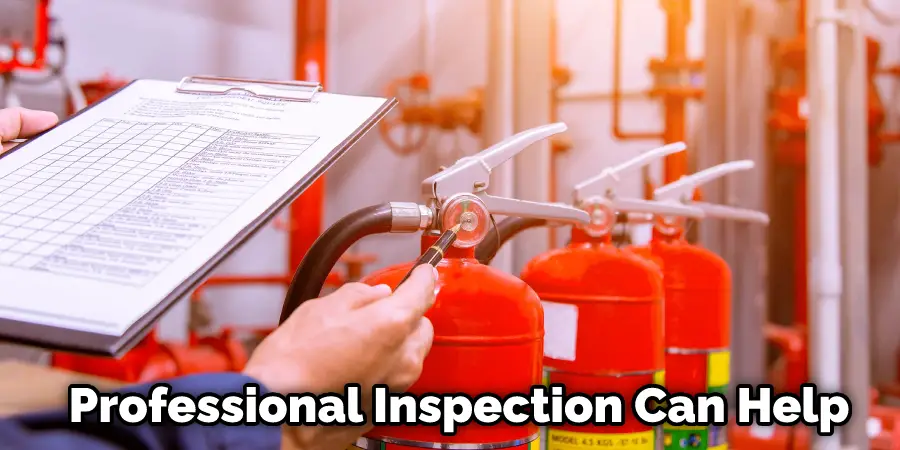
Safety Tips for How to Prevent a Garage Fire
- Store flammable liquids in containers with tight-fitting lids and keep them away from heat sources. Clean up oil and grease spills immediately.
- Do not store rags or other materials that could be soaked with flammable liquids near heat sources. Keep your garage well-ventilated.
- Do not store flammable liquids or solvents in the house. Store flammable liquids in a cool, dry place away from sunlight.
- Dispose of oily rags and other waste materials in a metal container with a lid. Never smoke in the garage.
- Keep a fire extinguisher in the garage and know how to use it. Do not use gasoline-powered lawnmowers or other equipment in the garage.
- Have your electrical system, including wiring and outlets, inspected by a qualified electrician every three to five years. Do not overload circuits or extension cords.
- Do not store combustible materials, such as paper or cardboard, near the furnace or water heater. Inspect the garage door opener monthly to make sure it is functioning properly.
- Have your natural gas appliances serviced by a qualified technician at least once a year.
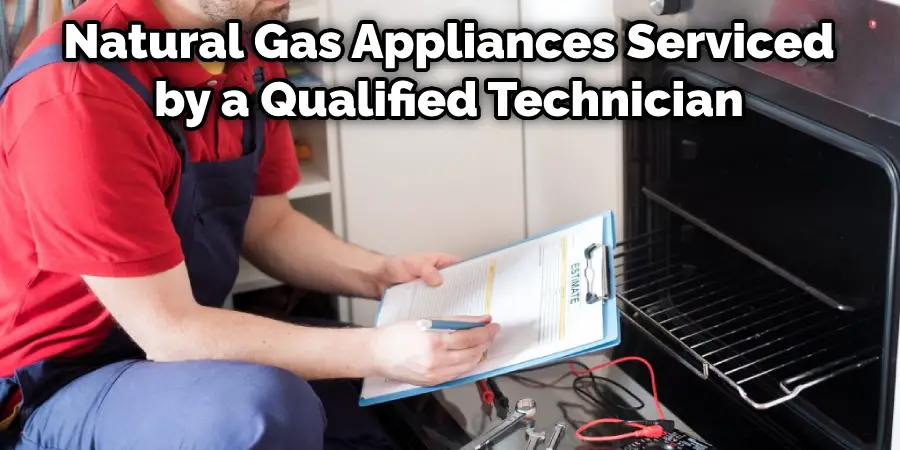
How Do Garage Fires Start?
Garage fires typically start from three main sources: heat, electricity, and flammable liquids.
Heat-related garage fires usually start from something as simple as a space heater being left on or a dryer vent blowing hot air into the space. If you have any appliances in your garage, ensure they are turned off and unplugged when not in use.
Electrical garage fires are typically caused by faulty wiring or overloaded outlets. If you notice any sparks or exposed wires in your garage, have an electrician come out and take a look. Do not try to fix it yourself!
Flammable liquids like gasoline, oil, and paint thinner are common in many garages. If these liquids are not stored properly, they can easily catch fire. Ensure all flammable liquids are kept in sealed, labeled containers away from any heat sources.
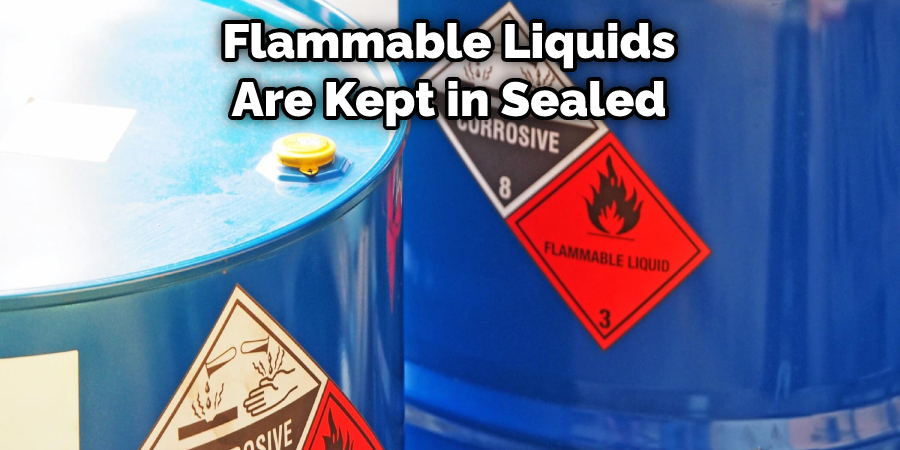
How Can You Prevent a Garage Fire From Starting in Your Home?
One of the best ways to prevent a garage fire from starting in your home is to ensure that you keep all flammable materials stored properly. This means keeping them in closed containers and away from any heat sources. Additionally, you should never leave gasoline or other flammable liquids sitting out in open containers.
If you have a workshop in your garage, be sure to keep any tools and materials that could create a spark away from any flammable liquids. Finally, always make sure to dispose of any oily rags or other combustible materials properly.
Another way to help prevent a garage fire is to install working smoke detectors in the area. These can alert you to a fire before it has a chance to spread, giving you time to get out safely and call the fire department. Additionally, you should have a fire extinguisher on hand in case of an emergency.
Following these simple tips can help prevent a garage fire from starting in your home. However, if a fire breaks out, evacuate immediately and call the fire department.
What Should You Do if You Have a Fire in My Garage?
A garage fire is a serious hazard that can endanger your home and your family. Fortunately, you can take some simple steps to prevent a fire from starting in your garage. First, make sure that all flammable materials are stored properly. Gasoline, oil, and other flammables should be kept in approved containers and stored away from any heat sources.
Second, keep your garage clean and free of clutter. A cluttered garage is a prime breeding ground for fires. Finally, have a working smoke alarm installed in your garage. This will give you an early warning if a fire does start, allowing you to take action quickly. Following these simple tips can help keep your garage safe from fire hazards.
Is It Necessary to Consult With a Private Company to Prevent Fire?
Yes, while many individuals consider installing a home fire sprinkler system a do-it-yourself project, it is always best to consult with a professional company that specializes in this type of work. This will ensure that your system is installed properly and will work effectively in the event of a fire.
You can do several things to help prevent a fire from starting in your garage. First, ensure that all flammable materials are stored properly and away from any heat sources. This includes gasoline, oil, paint thinners, and other chemicals. Also, keep your garage clean and free of clutter. This will help to prevent a fire from spreading quickly if one should start.
Finally, ensure that your smoke detectors are working properly and that you have a readily available fire extinguisher. Taking these simple precautions can help prevent a garage fire from happening in your home.
How Much Will It Cost for Consultation?
The consultation cost will depend on your project’s size and scope. For a small garage, the average cost is $300. For a medium-sized garage, the average cost is $500. For a large garage, the average cost is $1,000. For a more comprehensive project, the cost will be higher. However, the average cost is still $3,000.
Conclusion
However, it’s important to be prepared in case of an emergency. You can take a few simple steps to help prevent a garage fire from starting in the first place. First, make sure to keep flammable liquids like gasoline and oil in properly labeled containers.
Second, don’t store any flammable materials near the furnace or water heater. Third, keep your garage tidy and free of clutter. Fourth, have a working smoke detector installed in the garage.
Finally, be sure to regularly inspect any electrical wiring for signs of wear or damage. Following these simple tips can help keep your garage safe from fire hazards. I hope this article has been beneficial in learning how to prevent a garage fire. Ensure that precautionary measures are put into place in your garage to help avoid any future disasters.
I am Rick. I grew up helping my dad with his handyman service. I learned a lot from him about how to fix things, and also about how to work hard and take care of business. These days, I’m still into fixing things- only now, I’m doing it for a living.
I’m always looking for new ways to help people grow and develop. That’s why I have created this blog to share all my experience and knowledge so
that I can help people who are interested in DIY repair.

